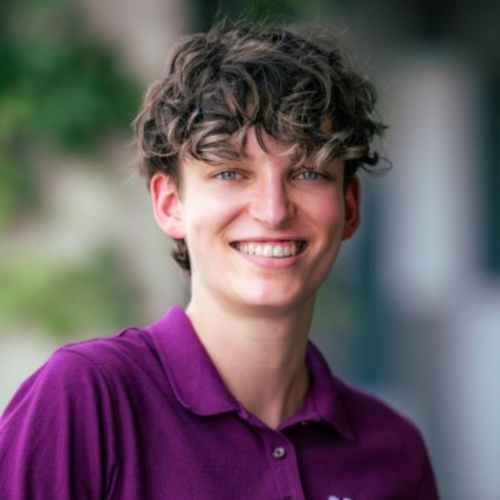Jensen Coonradt, 19

Jensen Coonradt: The Inventive Polymath and Passionate STEM Advocate
From dreaming of flight with paper wings at age seven to developing AI models impacting policy, Jensen Coonradt is an extraordinary innovator and a dedicated member of the hacker community. Currently pursuing a Bachelor of Science degree in Electrical Engineering and Computer Science and a Bachelor of Science in Mathematical Economics at MIT (Class of ‘28), Jensen's passion for invention ignited in a second-grade robotics class and has only grown. They’ve led NASA-funded research on urban heat islands, had research on PM2.5 pollution published by FermiLab during their time as a high school intern, and their AI paper on diffusion-based LLMs was accepted to the prestigious Tapia Conference. Hackathons are a natural fit for Jensen's inventive spirit; they've participated in over a dozen, winning top honors for projects like "pAIdback," an AI platform helping low-income consumers claim refunds—earning $50,000 in funding and "Lendora," a blockchain-based fractional loan marketplace that was acquired by BankSocial and will be piloted with the Federal Reserve.
Jensen's first MLH hackathon, Hack@Brown, was a turning point. Initially hesitant, they were quickly hooked by the electric atmosphere and the collaborative spirit, teaming up with students who are now lifelong friends to build an AR medical assistant and winning an award despite having no prior AR experience. This experience cemented their love for the hackathon environment, where they thrive on rapid learning and building impactful solutions. Deeply involved in MIT’s tech community, Jensen is an executive in the Full Stack Development Club (leading the "SoFrat" app), helps organize the MIT Climate Hackathon, and leads development of an assistive AI app for individuals with dementia within the MIT AI Club—where the team recently won the Cerebras Hackathon.
Committed to accessibility and equity, Jensen, a Pell Grant-eligible student, teaches free coding and circuitry classes to Boston high schoolers through MIT Cascade and plans to serve as an MIT FLI ambassador. Their journey from founding a STEM club at their Title I high school (winning $65,000 for a student makerspace) to becoming a national champion in Business Law and Ethics showcases their diverse talents. While Assembly is their unconventional favorite language, Python is their go-to language for hackathons, and Hedera is their preferred platform for decentralized applications. Jensen's story is one of resilience, leadership, and an unwavering belief in using innovation to make the world a better place, one invention at a time.
Quick Facts
Jensen Coonradt, 19

Jensen Coonradt: The Inventive Polymath and Passionate STEM Advocate
From dreaming of flight with paper wings at age seven to developing AI models impacting policy, Jensen Coonradt is an extraordinary innovator and a dedicated member of the hacker community. Currently pursuing a Bachelor of Science degree in Electrical Engineering and Computer Science and a Bachelor of Science in Mathematical Economics at MIT (Class of ‘28), Jensen's passion for invention ignited in a second-grade robotics class and has only grown. They’ve led NASA-funded research on urban heat islands, had research on PM2.5 pollution published by FermiLab during their time as a high school intern, and their AI paper on diffusion-based LLMs was accepted to the prestigious Tapia Conference. Hackathons are a natural fit for Jensen's inventive spirit; they've participated in over a dozen, winning top honors for projects like "pAIdback," an AI platform helping low-income consumers claim refunds—earning $50,000 in funding and "Lendora," a blockchain-based fractional loan marketplace that was acquired by BankSocial and will be piloted with the Federal Reserve.
Jensen's first MLH hackathon, Hack@Brown, was a turning point. Initially hesitant, they were quickly hooked by the electric atmosphere and the collaborative spirit, teaming up with students who are now lifelong friends to build an AR medical assistant and winning an award despite having no prior AR experience. This experience cemented their love for the hackathon environment, where they thrive on rapid learning and building impactful solutions. Deeply involved in MIT’s tech community, Jensen is an executive in the Full Stack Development Club (leading the "SoFrat" app), helps organize the MIT Climate Hackathon, and leads development of an assistive AI app for individuals with dementia within the MIT AI Club—where the team recently won the Cerebras Hackathon.
Committed to accessibility and equity, Jensen, a Pell Grant-eligible student, teaches free coding and circuitry classes to Boston high schoolers through MIT Cascade and plans to serve as an MIT FLI ambassador. Their journey from founding a STEM club at their Title I high school (winning $65,000 for a student makerspace) to becoming a national champion in Business Law and Ethics showcases their diverse talents. While Assembly is their unconventional favorite language, Python is their go-to language for hackathons, and Hedera is their preferred platform for decentralized applications. Jensen's story is one of resilience, leadership, and an unwavering belief in using innovation to make the world a better place, one invention at a time.



